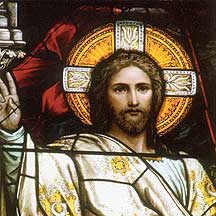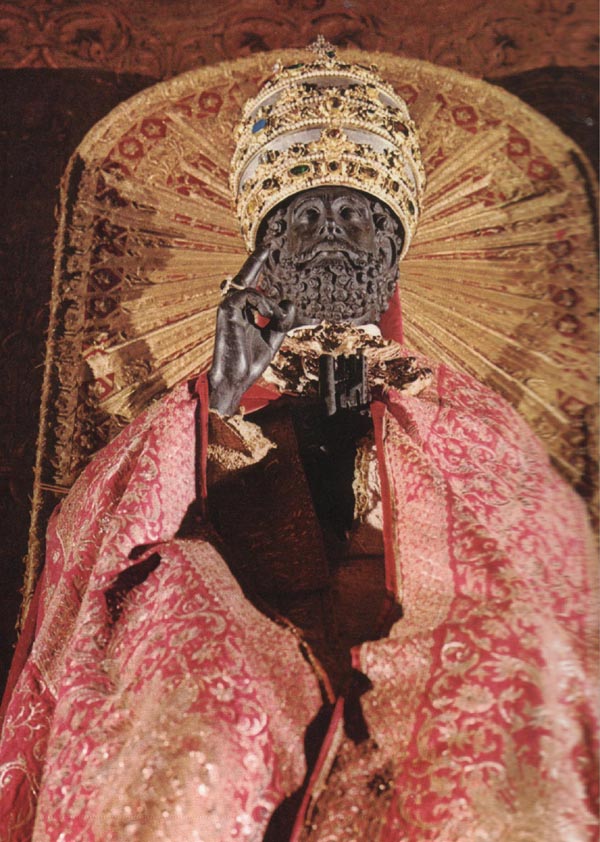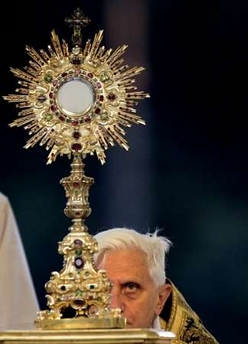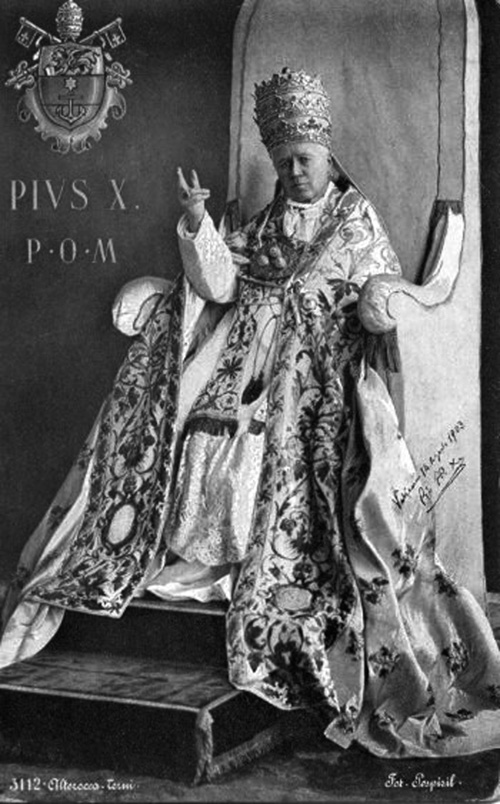 A couple looks at a billboard calling for a 'no vote' on an abortion referendum, in Fatima Catholic shrine in central Portugal February 5, 2007. This month, Catholic Portugal may decide to break ranks with a small group of countries including Ireland and Poland and legalise abortions, in a referendum which some cast as a deeper test of its readiness for progress. 'Por Vontade de Deus' means 'By God's Will' REUTERS/Jose Manuel Ribeiro (PORTUGAL)
A couple looks at a billboard calling for a 'no vote' on an abortion referendum, in Fatima Catholic shrine in central Portugal February 5, 2007. This month, Catholic Portugal may decide to break ranks with a small group of countries including Ireland and Poland and legalise abortions, in a referendum which some cast as a deeper test of its readiness for progress. 'Por Vontade de Deus' means 'By God's Will' REUTERS/Jose Manuel Ribeiro (PORTUGAL)In our concern with the happenings in England, the US and in other parts of the world, let us not forget Portugal which first evangelized this country.
Let's pray to Our Lady of Fatima, who choose to bless Portugal and consecrate it to herself, that through her intercession, this vote, which would legalize abortion, will fail and many innocent unborn lives will be saved.
Portugal abortion vote to test modernityBy Axel Bugge Sun Feb 4, 6:52 PM ET
LISBON (Reuters) - This month, Catholic Portugal may decide to break ranks with a small group of countries including Ireland and Poland and legalize abortions, in a referendum which some cast as a deeper test of its readiness for progress.
On the face of it, the February 11 vote could resolve the estimated 23,000 abortions that take place in secret each year -- which Socialist Prime Minister Jose Socrates has called "Portugal's most shameful wound."
An anti-abortion activist, wrapped in a Spanish national flag and wearing a sticker reading 'I'm happy I was born', participates in a march through downtown Lisbon, Sunday, Jan. 28 2007, ahead of the national referendum on whether to legalize abortion scheduled for Feb. 11. Portugal has one of the most restrictive abortion laws in Europe. Abortions are illegal unless a woman has been raped, her health is in danger or the fetus is malformed and they can only be performed until the 12th week of pregnancy. The referendum will ask if abortion should be allowed for all women until the 10th week of pregnancy. (AP Photo/Armando Franca)
Women walk by a campaign billboard in downtown Lisbon Monday, Feb. 5, 2007, ahead of the national referendum on whether to legalize abortion scheduled for Feb. 11. Portugal has one of the most restrictive abortion laws in Europe and the referendum will ask if abortion should be allowed for all women until the 10th week of pregnancy. The billboard reads 'you're still in time to save many lives. vote no thanks'. (AP Photo/Armando Franca)
But -- even though campaigners on both sides say the issue goes beyond a woman's right to choose -- almost half the Portuguese may ignore the referendum. That would repeat an experience from 1998 when only 32 percent voted and the outcome ruled invalid.
The battle lines are clear: Portugal's Catholic church -- whose members make up 90 percent of the population -- argues that lifting the ban could open the way to moral decay in what is one of Europe's most traditional countries.
On the 'yes' side, liberals hope to stop women facing prison sentences if they abort, often in clandestine, back-street operations; they also want to usher in more open attitudes in a country where conservatism remains the overwhelming norm.
People walk underneath campaign billboards in downtown Lisbon Monday, Feb. 5 2007, ahead of the national referendum on whether to legalize abortion scheduled for Feb. 11. Portugal has one of the most restrictive abortion laws in Europe and the referendum will ask if abortion should be allowed for all women until the 10th week of pregnancy. Foreground billboard reads '...punished with up to 3 years in jail' and 'vote yes to change the law'. (AP Photo/Armando Franca)
"A 'yes' vote will not just be a victory for women's rights, but will also show the possibility of victory against conservatism," said Alda Sousa, a member of the national executive of the Left Bloc of parties in parliament.
If approved, abortions will be allowed in the first 10 weeks of pregnancy.
The Catholic Church warns that allowing abortions could open a slippery slope on other issues such as gay marriages.
"We are a country of great customs but the pressure on these big questions is beginning to be felt," said Cardinal Jose Policarpo, the head of the Catholic Church in Portugal.
Polls show the number in favor of lifting the abortion ban outnumber those against, but more than 40 percent are either undecided or will not vote. If less than 50 percent of the electorate takes part the result is invalid.
Thousands of pro-life activists take part on a march in Lisbon, 28 January 2007. Official campaigning began in Portugal for a referendum on whether to relax the nation's abortion law, one of Europe's most restrictive, with polls indicating support for liberalisation is slipping.(AFP/File/Francisco Leong)
A sticker reading 'Fragile, vote no' is seen on a pole in downtown Lisbon Thursday, Feb. 1 2007, ahead of the national referendum on whether to legalize abortion schedulled for Feb. 11. Portugal has one of the most restrictive abortion laws in Europe. Abortions are illegal unless a woman has been raped, her health is in danger or the fetus is malformed and they can only be performed until the 12th week of pregnancy. The referendum will ask if abortion should be allowed for all women until the 10th week of pregnancy. (AP Photo/Armando Franca)
BIG SHIFTS TAKE TIME
Since the 1998 vote, Portugal became one of the first countries to join the euro and had a booming economy for a few years followed by a bust that has undermined the country's prospects, not least its ability to compete in an increasingly globalized world.
A massive budget deficit prompted the economic troubles and Socrates is introducing tough economic reforms to resolve it, but like deep social changes, big shifts take time.
Slow economic development is holding back social change, says Marina Costa Lobo, a political scientist at Lisbon's Social Sciences Institute. The country of 10 million people is the poorest in western Europe, with per capita income of about 15,000 euros ($19,530).
"Generally, there is a strong relationship between economic development and more modern attitudes," she said. "Lagging development is the reason Portugal hasn't adopted new attitudes. Even the left here is conservative."
A woman walks past an abortion pamphlet in Lisbon February 6, 2007. Portugal will go to the polls in a referendum to decriminalise abortion in the first 10 weeks of pregnancy on February 11. The pamphlet reads, 'The abortion is not solved in the court. The abortion is not solved in the prison. Vote Yes'. REUTERS/Nacho Doce (PORTUGAL)
That argument is borne out by the fact the abortion vote in 1998 showed the richer, urban centers like Lisbon and Setubal in favor while poorer, northern rural areas were against.
In this country -- where the formal 'voce' version of 'you' remains the most widely used -- conservatism is also reinforced by one of Europe's fastest-aging populations.
Portugal's old-age dependency ratio, or the proportion of retired people relative to workers, is now at 24.9 percent, above the European average of 24.5 percent. But it will rocket to 58.1 percent by 2050.
Portuguese anti-abortion supporter Filipa Perestrelo looks at an anti-abortion billboard in Lisbon in this January 30, 2007 file photo. In February 2007, Catholic Portugal may decide to break ranks with a small group of countries including Ireland and Poland and legalise abortions, in a referendum which some cast as a deeper test of its readiness for progress. To match feature PORTUGAL-ABORTION/ REUTERS/Marcos Borga/Files (PORTUGAL)
A man carries his son next to a banner during a march against abortion in Lisbon January 28, 2007. The banner reads 'Abortion on request, no thanks'. REUTERS/Nacho Doce (PORTUGAL)
A Eurobarometer survey of 25 countries last year measuring 'socio-cultural' values showed Portugal was the seventh most traditional in Europe. That aligned it with the poorer, new eastern European EU members.
For modern-minded Portuguese that rating may be especially galling when considering Portugal's historic rival Spain has jumped into the ranking of Europe's third most liberal country as its economy boomed over the past decade.
"Spain is what Portugal could have been if it had developed," said Costa Lobo.
SPANISH EXAMPLE
Spain has allowed abortions since 1987 and its first gay marriages took place in July 2005. In Portugal, only 29 percent agree gay marriage should be allowed, against an average of 44 percent in the EuropeanUnion Eurobarometer showed.
Other Portuguese say the country's lagging development is because of the years it spent under dictator Antonio Salazar. Salazar's 1933-74 regime controlled Portugal's economic, social and cultural life, helped by a repressive secret police force.
An anti-abortion woman gestures next to a poster of a foetus in Lisbon February 6, 2007. The placard reads 'O protagonista do Referedum' (Referendum's main character). Portugal will go to the polls in a referendum to decriminalise abortion in the first 10 weeks of pregnancy on February 11. REUTERS/Nacho Doce (PORTUGAL)
The Catholic Church was closely aligned with Salazar.
"Don't forget that Portugal was very closed for many, many years, with complete political control," said Ines Carvalho, a 35-year-old divorcee who intends to vote in favor of lifting the ban.
That leaves the vote too close to call, and its outcome may anyway be invalid if too few turn out. "If that happens, it shows that Portuguese society is just not prepared for this change," said Carvalho. Tue Feb 6, 2:42 PM ET
Cardinal urges Portugal to reject abortion in poll
Portugal's top cleric Cardinal Jose da Cruz Policarpo, seen here in 2005, urged followers to reject abortion as the predominantly Catholic country decides in a weekend referendum whether to liberalise the country's strict anti-abortion stance.(AFP/File/Francisco Leong)
LISBON (AFP) - Portugal's top cleric urged followers to reject abortion as the predominantly Catholic country decides in a weekend referendum whether to liberalise the country's strict anti-abortion stance.
Catholics must take into account the sanctity of life when casting their votes, Cardinal Jose da Cruz Policarpo said.
Sunday's referendum will ask voters if they agree with the legalization of abortion until the 10th week of pregnancy.
The conscience of Christians regarding abortion "must be illuminated not only by natural light but also by the word of God and the teachings of the Church," the cardinal, who is Partriarch of Lisbon, wrote in a text published on the Church's website.
Predominantly Roman Catholic Portugal has one of the most restrictive laws against abortion in Europe.
The practice is currently allowed only until the 12th week of pregnancy in cases of rape, a malformed foetus or if the woman's life is in danger.
The influential Church has vocally opposed any change to the law during the referendum campaign, with bishops and priests frequently speaking out from the pulpit against liberalisation.
Two Church-run daycare centres in Setubal, a port city some 50 kilometres (30 miles) south of Lisbon, handed out copies of a letter purportedly from an aborted foetus to its mother which angered some parents and sparked controversy.
"Mom how were you able to kill me? How were you able to allow me to be cut up in pieces and thrown into a bucket?" asks the letter which was reprinted in several newspapers and Internet sites.
In a referendum held in 1998 voters upheld the existing abortion law by 51 percent to 49 percent, but the result was declared void as nearly seven out of 10 voters stayed away.
![[Unam Sanctam]](https://blogger.googleusercontent.com/img/b/R29vZ2xl/AVvXsEiymQ2adTjpZ1ABhPBbBBquiPCxeQrc4Jy_97vOikT0wGQeJleriiXQy6ebnb0jrYe-TfvcK77txStB4aIwVAdD41ZdMkVfNtFGC0JX6LBV9B8mfeRZaIAM7Sj-011ag3DiKQzv/s1600/headerdivinemercy.jpg)













































































7 comments:
'Test modernity'? Legalised infanticide is modernity, is it? And this they call progress.
Bring me back to the 'dark ages' anytime!
Wow, and I thought I was the only one to miss the Middle Ages. What a relief to be wrong!
They went ahead with it. The turnout wasn't high enough to be legal, but they're going to do it anyway.
That's very sad. What's with these new leftist governments anyway?
Give me Franco and Salazar anytime.
Only God knows, I suppose. From their behaviours, though, all one can guess is that they hate life.
Still, at least today there'sgood news.
And, apparently, poor typing.
Post a Comment